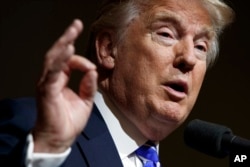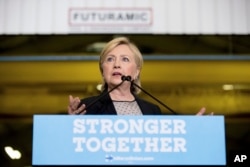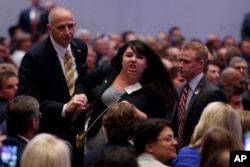Donald Trump’s claim that President Barack Obama “founded” the Islamic State may be just the latest controversy in a volatile election season, but those comments could have far-reaching consequences on perceptions of the U.S. internationally and on the continual media dilemma over how to cover remarks by the unconventional candidate.
In a campaign rally Thursday, Trump called Obama and Democratic presidential nominee Hillary Clinton “the MVPs of ISIS,” reiterating claims from a day earlier when he told a crowd of supporters at a campaign stop in Florida that Obama is “the founder of ISIS. He's the founder of ISIS. He's the founder. He founded ISIS.” ISIS is an acronym for the militant group.
Trump then said the co-founder of Islamic State was "crooked Hillary Clinton."
The Republican presidential nominee has already claimed the former secretary of state’s policies while in office encouraged the growth of the terror group, but his comments Wednesday and doubling-down of those statements escalated his claims regarding the Obama administration’s role in the region and the growth of IS.
The White House declined to comment on Trump's claim, while Clinton's campaign called the remarks "false."
What is IS?
Islamic State is a group of hard-line jihadists that once dominated large areas of Iraq and Syria and is infamous for its sheer brutality, including beheadings, drownings, burning people alive, rape and the promotion of slavery.
Initially a largely Sunni Arab group, IS grew out of the terrorist organization known as al-Qaida in Iraq (AQ-I) led by Jordanian Abu Musab al Zarqawi in 2004. AQ-I fed off the deep sense of Sunni disenfranchisement after the United States decided to disband the Iraqi army and Saddam Hussein's powerful Ba'ath party.
“It’s inflammatory, but it’s more than that,” said David Rothkopf, CEO and editor of the Foreign Policy Group, of Trump’s latest statements. “It’s encouraging tropes that Obama is a Muslim, that Obama isn’t American, that Obama doesn’t have the same goals and values."
Some Republicans have criticized Obama and Clinton for not being aggressive enough in attacking the Islamic State group as it was seizing territory in Iraq and Syria two years ago. But no top Republican has gone so far as to accuse the president of founding the group.
Rothkopf said criticism of Obama’s foreign policy is entirely fair game this presidential campaign season.
Policy question
“Is Barack Obama’s foreign policy above reproach? Absolutely not. Has Barack Obama made some serious errors in his handling of the issues in the Middle East? If you’re a credible candidate and you’re running against Barack Obama, by all means take him to task for inaction in Syria, take him to task for his actions in Libya," he said.
But, Rothkopf added, the claim that Obama created the Islamic State was “outrageous, insupportable, and inflammatory,” creating a troubling moment not only in the campaign but also for worldwide perceptions of democracy in the United States.
In addition, Trump’s claims about the Obama administration and Islamic State may give new life to conspiracy theories in the U.S. among members of the far-right and about its origins floating around the Middle East and South Asia, he said.
“It doesn’t just stir up Trump supporters, it makes America look terrible in the world. The reality is that every time these days that Donald Trump opens his mouth, America is diminished in the eyes of the world," Rothkopf said.
Challenge for news media
Trump’s comments leave journalists in the difficult position of covering him without appearing to attack him.
“It’s challenging because do you say 'Donald Trump says Barack Obama is the founder of ISIS' and then say, in fact, he’s not. Do you call the Obama White House and ask him to deny he’s the founder of ISIS,” asked Susan Page, Washington Bureau Chief at USA Today.
“Of course it is true that there’s a larger context and argument that Trump could make that says actions by the Obama administration did open the door and lead to the rise of ISIS, but that’s not what Donald Trump said," Page said.
She said journalists have to stick to the basic tenets of their profession by providing information, context and fact-checking “to inform voters about the accuracy of what he’s saying.”
But providing evidence and context may be more difficult when it comes to Trump’s unique approach to politics, said Lara Brown at the Graduate School for Political Management at The George Washington University.
'The way most salesmen sound'
“No part of Donald Trump focuses on subtleties – he sounds the way most salesmen sound when they are trying to sell you a product that has dubious benefits,” Brown said, adding that while Trump’s statements are anything but subtle, his words do have a long-range impact.
She said Trump is well aware of the signals he is sending by using Obama's middle name of Hussein, implying a possible Muslim conspiracy and leaving the door open to renew his arguments if additional terror attacks occur.
“He is attaching a label to them and making sure that Americans don’t ever hear the word ISIS without hearing founder and co-founder so he is speaking as salesmen speak. He is branding, he is vague, and he is declarative and confident,” Brown said.
It may not be a winning strategy.
Trump's controversial statements and blunt attacks on his political opponents have divided the Republican Party, with some leading party members denouncing his candidacy and calling him unfit to lead. Opinion polls have shown his campaign is in danger, with Trump trailing Clinton in several key states and Trump's support eroding in some traditional Republican strongholds.
“He really seems to have a lack of understanding about who is winning the day and why you should try to win the day,” Brown said.







